![]()
Austria | Germany 2021
Opening November 18, 2021
Directed by: Sebastian Meise
Writing credits: Sebastian Meise, Thomas Reider
Principal actors: Franz Rogowski, Georg Friedrich, Anton von Lucke, Thomas Prenn
 Austrian director-screenwriter Sebastian Meise’s (Still Life [Stilleben], 2011) Great Freedom is masterful in its complexity, and spectacular in its simplicity. Cruelly simple: Germany’s 123-year law, Paragraph 175, criminalizing homosexuality allowed invasion of privacy, divulging sensitive private information to the public, prison sentences of up to ten years; §175 was worse during the Third Reich, yet unbelievably, afterward Germany permitted the law to continue until 1969, and it was 1994 before Paragraph 175 was withdrawn from the country’s civil law.
Austrian director-screenwriter Sebastian Meise’s (Still Life [Stilleben], 2011) Great Freedom is masterful in its complexity, and spectacular in its simplicity. Cruelly simple: Germany’s 123-year law, Paragraph 175, criminalizing homosexuality allowed invasion of privacy, divulging sensitive private information to the public, prison sentences of up to ten years; §175 was worse during the Third Reich, yet unbelievably, afterward Germany permitted the law to continue until 1969, and it was 1994 before Paragraph 175 was withdrawn from the country’s civil law.
Meise’s storyline/screenplay, co-written with (Thomas Reider), originated from this fact: “Paragraph 175 allowed the state to persecute homosexuals, which it did with great effort and meticulousness. … Their persecution would not be over for them for decades. This was the starting point of our story.” Separated into three time periods parallel to our protagonist’s prison sentences, 1945, 1957 and 1968, they align with the film’s three main themes, i.e., human’s capacity for degradation, acquiescence, and human’s yearning for relationships.
Prison is a revolving door for Hans Hoffmann (Franz Rogowski). A quiet guy, he is also observant in noticing peripheral opportunities and advantages. Freed only to be jailed again, in 1945 Hans meets Viktor (Georg Friedrich); the convicted murderer rails against having a “175er” cellmate. Nevertheless, watching Hans’ reticence-cum-rebellious yet silent stoicism, when he accidentally glimpses Hans’ arm Viktor offers his tattooing “skill” prior to his release. Wanting to start afresh, Hans’ (ostracized) sexual impulses soon land him back inside. Once there, ironically he and Viktor subsequently settle into a circumspect fellowship. Leo (Anton von Lucke) and Oskar (Thomas Prenn) come, and go. The years pass; mutually, they come to understand how deep their friendship is, and the support each gives the other. And, that the price for freedom is high.
Franz Rogowski’s performance is exquisite, unforgettable. Add Georg Friedrich’s performance, and they are spellbindingly good. The heart of the story is their perceptive performances that are tender, compassionate, and magnanimous; their portrayals turn §175 on its head, and each protagonist becomes a kind of “everyman,” i.e., someone audiences can identify with, beyond a particular subject. Crystel Fournier’s excellent cinematography is comprehensive, Joana Scrinzi’s remarkably timed editing is astute, Nils Petter Molvaer and Peter Brötzmann’s music splendid, and Jörg Theil, Atanas, and Manuel Meichsner’s sound intense.
Great Freedom pulls at the fundamental nature running through humankind directing attention to the great discrepancies between freedom of conscience, and institutionalism. The film is a great exemplification of Martin Luther King’s words, “Injustice anywhere is a threat to justice everywhere. We are caught in an inescapable network of mutuality, tied in a single garment of destiny. Whatever affects one directly, affects all indirectly.” Great Freedom is, quite simply, a must-see film. 116 minutes ()
